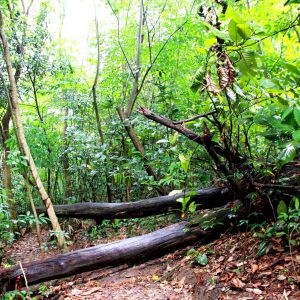The Binary of Man and Nature in Literary Studies
November 1, 2021

Formerly called Bukit Larangan (Forbidden Hill) and Government Hill, Fort Canning Park was renamed on 1 November 1981 by Singapore’s first Prime Minister, Lee Kuan Yew. Having been a burial ground for ancient kings, a residence for Sir Stamford Raffles, a fort during war, and a royal botanical garden, this lush hill is laden with rich history. Fort Canning Park has served the inhabitants of Singapore in various ways through the years, fulfilling the needs of humans and accommodating their desires.
Relating to the relationship between humans and nature, the field of ‘new ecology’ interests itself in the ongoing dialogue between man and the natural environment. This investigation into the influence of human culture on environmental change has gained prominence within literary studies as academics explore this bilateral relationship in the study of ecological narratives.
Two such narratives are Linus Asong’s The Crown of Thorns (1990) and Meira Chand’s A Different Sky (2010) which expound on the ecocultural landscape of postcolonial Cameroon and Singapore respectively, exposing imbalances in the countries’ ecologies. These novels are analysed by Associate Professor Chitra Sankaran (NUS Department of English Language and Literature) and Professor John Nkengasong (University of Yaoundé, Cameroon) in ‘Forests and ecocultural disequilibrium in two postcolonial novels from Cameroon and Singapore’ (The Journal of Commonwealth Literature, 2018) to investigate the “ecological disequilibrium” presented in the texts.
Despite being set in different countries during varied periods of Britain’s colonial history, both texts highlight the distinction between native and colonial attitudes towards forests in these equatorial post-colonies. In his text, Asong depicts nature’s wrath owing to man’s mistreatment of the forest and how the characters must perform rituals to atone and eventually coexist with their natural environment. Chand reveals the flaws and pettiness of humans through the colonial mishandling of forests, resulting in the increasing disconnectedness between man and nature.
Ridiculing man’s attempt to surmount the vastness of nature, the authors portray forests as a refuge and political space that enables the symbiotic relationship of humans and their natural environment. Ultimately, the article asserts that the importance of studying the human/nature binary in literary works is essential as it transcends cultural boundaries.
Read the full article here.
